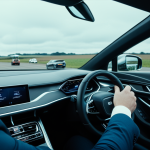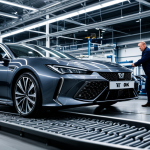Overview of Upcoming Technological Innovations in the UK Automotive Industry
The landscape of the UK automotive industry is on the cusp of transformation, driven by key future automotive technologies. Understanding these innovations is crucial for stakeholders, as they navigate an evolving market shaped by cutting-edge developments. The sector is being influenced by advances in autonomous vehicles, electric mobility, sustainable practices, and connectivity.
An important focus is the advancement in autonomous vehicles, which aim to revolutionize safety and efficiency in transport. Developments in EV (Electric Vehicle) technology are also pivotal, with the UK leading the charge in developing the infrastructure necessary for these vehicles to thrive. As the industry leans on sustainable manufacturing, the emphasis on eco-friendly practices is more pronounced than ever, ensuring that production aligns with environmental goals.
Also to read : What Factors Will Drive the Future of Electric Vehicles in the UK?
Market transformation trends underscore a shift towards connected vehicles and automotive digitalization, emphasizing smart technology integration. Such innovations highlight the sector’s commitment to offering enhanced driving experiences. This wave of technological change is not only limited to product development but also extends to manufacturing processes, materials used, and consumer interaction points. Each of these areas contributes to a rapidly evolving industry landscape, setting the stage for future growth and innovation in the UK automotive market.
Electric Vehicle Advancements
The UK EV market is at the forefront of automotive transformation, with remarkable strides in EV technology. Developments in battery technology—particularly solid-state batteries—are pivotal. They promise significant improvements in vehicle performance and range, heralding a new era of efficiency for electric vehicles. Solid-state batteries eliminate the flammability risks associated with liquid electrolytes, making them inherently safer while also offering faster charging capabilities and longer lifespans.
Also read : How is the UK automotive industry supporting sustainable supply chains?
With battery evolution, the focus shifts to charging infrastructure development. The expansion of rapid charging networks across urban areas is crucial for supporting increased EV adoption. The UK is investing in widespread installation of charging points to ensure accessibility and convenience, reducing range anxiety for drivers. Such infrastructure bolsters consumer confidence, facilitating a smoother transition from traditional vehicles to electric ones.
Equally significant are the government policies and incentives that accelerate EV adoption. The UK government has implemented various initiatives, including grants for EV purchases and investments in charging facilities, to promote electric vehicle integration. Legislations aim to phase out petrol and diesel vehicles, marking a commitment to a sustainable automotive future. These measures not only drive consumer interest but also stimulate industry-wide innovation, underscoring the importance of aligning policy with technological advancement in this ever-evolving sector.
Automation and Autonomous Vehicles
The advent of autonomous vehicles is reshaping the landscape of the UK automotive industry, ushering in a new era marked by heightened safety and driving efficiency. Central to this transformation are the distinct levels of vehicle automation as defined by the Society of Automotive Engineers (SAE). Ranging from Level 0, where no automation is involved, to Level 5, which represents full automation, these levels provide a framework for understanding the capabilities and limitations of current and emerging driving technology.
Levels of Vehicle Automation
Levels 0 to 5 encapsulate various degrees of autonomy. Currently, many vehicles operate at Level 2, where automation assists but human oversight is essential. Level 3 introduces conditional automation, enabling vehicles to handle certain driving tasks independently but requiring driver intervention when necessary. Looking towards the future, Levels 4 and 5 aim for automation that could eliminate the need for human input entirely, propelling the UK market towards groundbreaking innovations.
Safety and Regulatory Implications
The safety advantages of autonomous vehicles are profound, promising reductions in human error-related accidents. However, this progressive driving technology also encounters regulatory challenges. The existing legislative framework must evolve to accommodate these advancements, ensuring that safety standards keep pace with innovation. This involves meticulous scrutiny of vehicle performance, data security measures, and the ethical implications of decision-making protocols in autonomous systems.
Consumer Acceptance of Autonomous Driving
While the technological potential is vast, consumer acceptance of autonomous vehicles remains a pivotal factor. Surveys reveal a mix of excitement and apprehension among the public. Confidence in system reliability and safety needs to be established to drive widespread adoption. Opportunities for educative initiatives exist, aimed at demystifying technology and demonstrating tangible benefits, facilitating a smoother transition to an autonomous future for the UK’s driving populace.
Sustainable Practices in Automotive Production
In the quest for a greener future, the UK automotive industry is advancing towards sustainable manufacturing practices, placing significant emphasis on eco-friendly practices. This section highlights the incorporation of sustainability into automotive production, focusing on initiatives like the circular economy and the use of alternative materials.
Circular Economy Initiatives
The circular economy revolves around minimizing waste and making the most of resources. In the automotive context, this involves recycling and reusing materials within the supply chain to reduce environmental footprints. Implementing such initiatives aids in conserving resources and lowering greenhouse gas emissions, contributing to the overarching goals of sustainability.
Use of Alternative Materials
To further enhance sustainability, the industry is exploring bio-based materials as substitutes for traditional resources. These materials, such as plant-based polymers and recycled composites, are gradually being integrated into vehicle components. Their adoption not only supports eco-friendly manufacturing but also leads to lighter vehicles, thereby improving fuel efficiency and reducing emissions.
Carbon Neutral Goals
UK automakers are setting ambitious timelines to achieve carbon neutrality, aligning with the growing demand for sustainable automotive solutions. By committing to carbon-neutral operations, these companies aim to minimize their impact on climate change. This involves investment in renewable energy, cleaner production methods, and offsetting emissions through various environmental projects. Such goals underscore the industry’s dedication to a sustainable future, reinforcing its role in a global effort to curb climate change.
Impact of Connectivity and Digitalization
The move towards connected vehicles and automotive digitalization is reshaping how we experience driving and interact with our vehicles. This section delves into key areas like Vehicle-to-Everything (V2X) communication, data utilization, and cybersecurity, which are pivotal in the ongoing technological transformation in the UK automotive industry.
Vehicle-to-Everything (V2X) Communication
V2X communication offers a remarkable advancement by connecting vehicles with their surroundings, including infrastructure and other vehicles. It significantly enhances traffic management and safety by enabling real-time data exchange. With V2X, vehicles can anticipate and react to traffic conditions, improving flow and reducing congestion—a crucial innovation for urban areas.
Data Utilization for Enhancements
Data analytics plays a central role in driving smart technology adoption by leveraging vehicle data to enhance user experiences. It informs improvements in navigation systems, predictive maintenance, and personalized driving environments, illustrating how connectivity can transform driving into a seamless, efficient experience.
Cybersecurity in Connected Vehicles
As vehicles become increasingly connected, ensuring robust** cybersecurity** becomes imperative. Protecting vehicle systems from cyber threats is essential to maintain safety and consumer trust. Advanced measures are being implemented to safeguard data integrity and ensure secure vehicle operations, underscoring the necessity of cybersecurity in this digital age.
Case Studies and Real-World Applications
Examining automotive case studies reveals how innovations are applied in real-world contexts, significantly impacting the industry. These industry examples not only illustrate technological advancements but also help in understanding the practical implementation of cutting-edge solutions.
Leading UK Automotive Brands’ Innovations
Notable companies such as Jaguar Land Rover and BMW are at the forefront of innovation in practice, showcasing a commitment to integrating future automotive technologies. Jaguar Land Rover, for instance, has made strides in developing electric and hybrid models, emphasizing sustainable manufacturing. Meanwhile, BMW continues to push the envelope with its autonomous driving research and smart technology initiatives, reinforcing its leading position in the market.
Analysis of Market Leaders and Adoption Rates
The adoption rates of new technologies provide insights into UK automotive innovations. Reports reveal increasing consumer preference for electric vehicles and connected car features. Market leaders have excelled in adapting to these future automotive technologies, encouraging broader acceptance across the industry. This analysis shows how integral innovation is in setting trends and driving industry progress.
Success Stories of Technological Integration
Success stories abound in the automotive sector, with exemplary projects and partnerships demonstrating the potential of new technologies. Collaborative efforts, such as those between tech companies and automotive manufacturers, illustrate how innovation in practice can revolutionize product offerings. These partnerships have allowed for the seamless integration of driving technology and connected systems, thereby enhancing the overall driving experience and leading to significant consumer interest and adoption.
Future Market Trends and Predictions
With UK automotive market trends evolving rapidly, insights into future technological shifts are paramount. Industry experts anticipate a surge in technology adoption, with vehicles becoming more autonomous and connected, reflecting future automotive technologies trends. As car technologies advance, consumers can expect enhanced, smarter driving experiences.
Expert Insights and Predictions
Industry forecasts suggest a significant emphasis on automation and connectivity within the automotive sector. Experts predict that autonomous vehicles will see increased adoption and further integration of smart technology. This movement aligns with broader global trends, wherein drivers and passengers continue to value safety, efficiency, and connectivity in their automobiles. Such deployments will play a pivotal role in shaping long-term strategies for automakers.
Potential Economic Impacts
Economically, these advancements are poised to ignite substantial investments in infrastructure and job creation sectors. By nudging forward the UK automotive forecast, these innovations promise expanded opportunities across the industry, from development to production and support services. New technologies are likely to invigorate regional economies and reinforce the automotive sector’s pivotal role in the national landscape.
Consumer Behavior Changes
Shifting consumer behavior is indispensable to understanding the future trajectory of the automotive landscape. Increasing enthusiasm for connected and autonomous features indicates a qualitative change in purchasing preferences. As customers embrace future automotive technologies, their demands will drive further innovation, compelling manufacturers to keep pace with evolving expectations. These preferences herald a more personalised and technologically advanced future for the UK’s automotive industry.









